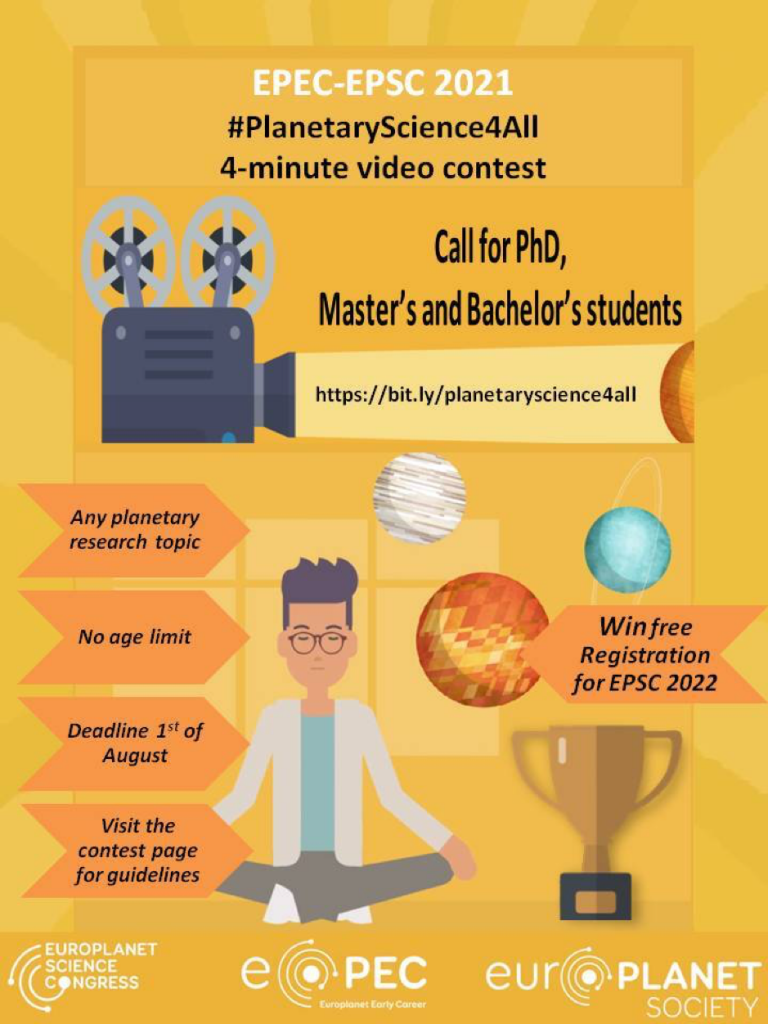Inspiring Stories – #PlanetaryScience4All: A Video Contest for Virtual Science Communication
In this EPEC Inspiring Outreach Story, Melissa Mirino (doctoral candidate at The Open University and of the Chair EPEC Communications Working Group) shares how the extraordinary experiences of 2020 inspired her to launch a contest to bring together the early career community. This story is an extract from the first Issue of the Europlanet magazine.
The year 2020 will be always remembered as a year of isolation, disruption of the normal daily activities, and in extreme cases a year of loss. However, during this period we all did our best to find alternative solutions to carry on with our lives, jobs and activities and remain positive and connected with each other using the current available technologies. Research and academia have not been an exception. Both the Europlanet Society and the Europlanet Early Career Network (EPEC) did their best to remain active, and to guarantee the usual sharing of ideas and scientific results by transforming the EPSC 2020 Conference into a virtual meeting.
As Chair of the EPEC Communications Working Group, I wanted to create an activity that could combine the EPEC goal of supporting early careers, our working group’s aim of communication, and the need to transform face-to-face activities into a shareable, interactive and online form to support the EPSC2020 virtual meeting. The idea of a video contest came to mind. This format is already considered by many universities as a good way to train and challenge students in science communication. Since the main subject of EPSC is planetary science, the topic of the video contest was easy to identify. With support from the EPSC2020 Outreach and Europlanet Communications teams, and many months of planning, creating and sharing the new activity, the #PlanetaryScience4All video contest became a reality. #PlanetaryScience4All challenges early career students to present their research in four minutes to a non-expert audience.
The first edition (2020) of the contest was open to Ph.D. candidates involved in planetary science studies, asking them to explain their Ph.D. research using any type of creative video format (Lego movies, drawing, PowerPoint, storytelling, etc.). The videos were judged based on criteria of scientific content, communication skills, and creativity by a panel of experts from the Europlanet Community. All the contestants and their videos were featured in live sessions during EPSC2020, promoted on YouTube, and shared widely on social media. The winning video was highlighted through the Europlanet website and newsletters, and it has also been used for EPEC outreach activities. The winner of the 2020 edition, Grace Richards, received free registration to this year’s EPSC2021 meeting. Recently, Grace and Gloria Tognon, another contestant, have also joined the EPEC Communications Working Group to support our activities. Based on the success of the 2020 competition, I feel confident that #PlanetaryScience4All will become a traditional part of EPSC.
The second edition is now open, this year welcoming Bachelor’s and Master’s students, as well as PhD candidates working on a thesis related to planetary science.
For more information FAQs, flyers, and the submission form visit: https://www.europlanet-society.org/early-careers-network/epec-communications-group/planetaryscience4all-video-contest/
Videos from the 2020 #PlanetaryScience4All contest can be found at: https://www.youtube.com/ playlist?list=PLPXeplhp1d00fmFd9vYXirNt_gyZrKOPA. The first Europlanet Magazine issue is available at: https://www.europlanet-society.org/europlanet-magazine/issue-1/?fbclid=IwAR38hwgnbbP6Y3Vn6RdQZNOZ_OPQhsFQuuvEGY5VhP4vUnebRRH_u9IJniQ#dearflip-df_16450/42/


